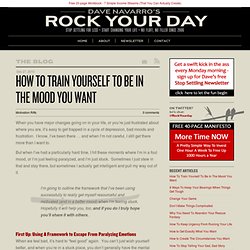

Welcome to Personality Type! Below are four questions, and descriptions of two different lists of personality "preferences.

" Both lists have their own strengths and blindspots. BOTH are equally valuable -- NEITHER one is better or worse than the other. Read both sets of descriptions for Question #1 and decide which list -- as a whole - describes you better (even if just a little better). Then click the appropriate button. Try to answer as you really are, not how you may wish you were, or have to be at work. Continue with the other three questions and hit the "Discover Your Type" button for your results.
We all feel like Introverts sometimes and Extraverts at other times, depending on the situation and how much time we've spent alone vs. with lots of people. Extravert You get energized by activity, people, variety and talking and when you are at social gatherings and probably prefer to talk to lots of people about a wide range of topics. Introvert Sensor. Tired of Not Being Able to Sleep? Here's a Real Solution. Circadian rhythm. Some features of the human circadian (24-hour) biological clock History[edit] The earliest recorded account of a circadian process dates from the 4th century B.C.E., when Androsthenes, a ship captain serving under Alexander the Great, described diurnal leaf movements of the tamarind tree.[1] The observation of a circadian or diurnal process in humans is mentioned in Chinese medical texts dated to around the 13th century, including the Noon and Midnight Manual and the Mnemonic Rhyme to Aid in the Selection of Acu-points According to the Diurnal Cycle, the Day of the Month and the Season of the Year.[2] The first recorded observation of an endogenous circadian oscillation was by the French scientist Jean-Jacques d'Ortous de Mairan in 1729.

The term circadian was coined by Franz Halberg in the 1950s.[10] Criteria[edit] To be called circadian, a biological rhythm must meet these three general criteria:[11] Origin[edit] 33 Sleep Aid Secrets. 30 Tips in 30 Days Designed to Help You Take Control of Your Health This article is included in Dr.

Mercola's All-Time Top 30 Health Tips series. Every day during the month of January, a new tip will be added that will help you take control of your health. Want to see the full list? Click here. Sleep is one of the great mysteries of life. One of the most radical and recent discoveries revealing the importance of sleep for health is that each and every organ, indeed each cell, has its own biological clock. In your brain is a "master clock" that synchronizes these clocks and your bodily functions to match the 24-hour light and dark cycle. When you upset your circadian rhythm by not getting enough sleep, the results cascade through your system, raising blood pressure, dysregulating hunger hormones and blood sugar, increasing the expression of genes associated with inflammation, immune excitability, diabetes, cancer risk and stress9 and much more.
Ideal Sleep Duration for Optimal Health 32. Types of Déjà Vu" Defining types of déjà vu is a very slippery area.

Those who have studied it have applied their own categories and differentiations -- each usually tied to a specific theory about what causes déjà vu. Alan Brown, a professor of psychology at South Methodist University and author of "The Déjà Vu Experience: Essays in Cognitive Psychology," has three categories for déjà vu. He believes there is déjà vu caused by biological dysfunction (e.g., epilepsy), implicit familiarity and divided perception. In 1983, Dr. Vernon Neppe, Director of the Pacific Neuropsychiatric Institute in Seattle, proposed four subcategories of déjà vu, including epileptic, subjective paranormal, schizophrenic and associative. How To Treat Others: 5 Lessons From an Unknown Author. Five Lessons About How To Treat People -- Author Unknown 1.

First Important Lesson - "Know The Cleaning Lady" During my second month of college, our professor gave us a pop quiz. Color Psychology. By David Johnson Like death and taxes, there is no escaping color.

It is ubiquitous. Yet what does it all mean? Why are people more relaxed in green rooms? Why do weightlifters do their best in blue gyms? Colors often have different meanings in various cultures. Black Black is the color of authority and power. White Brides wear white to symbolize innocence and purity. Red The most emotionally intense color, red stimulates a faster heartbeat and breathing. The most romantic color, pink, is more tranquilizing. Blue The color of the sky and the ocean, blue is one of the most popular colors. Green Currently the most popular decorating color, green symbolizes nature. Yellow Cheerful sunny yellow is an attention getter. Purple The color of royalty, purple connotes luxury, wealth, and sophistication.
Brown. How To Train Yourself To Be In The Mood You Want. Dec 27, 2010 When you have major changes going on in your life, or you’re just frustrated about where you are, it’s easy to get trapped in a cycle of depression, bad moods and frustration.

I know, I’ve been there … and when I’m not careful, I still get there more than I want to.